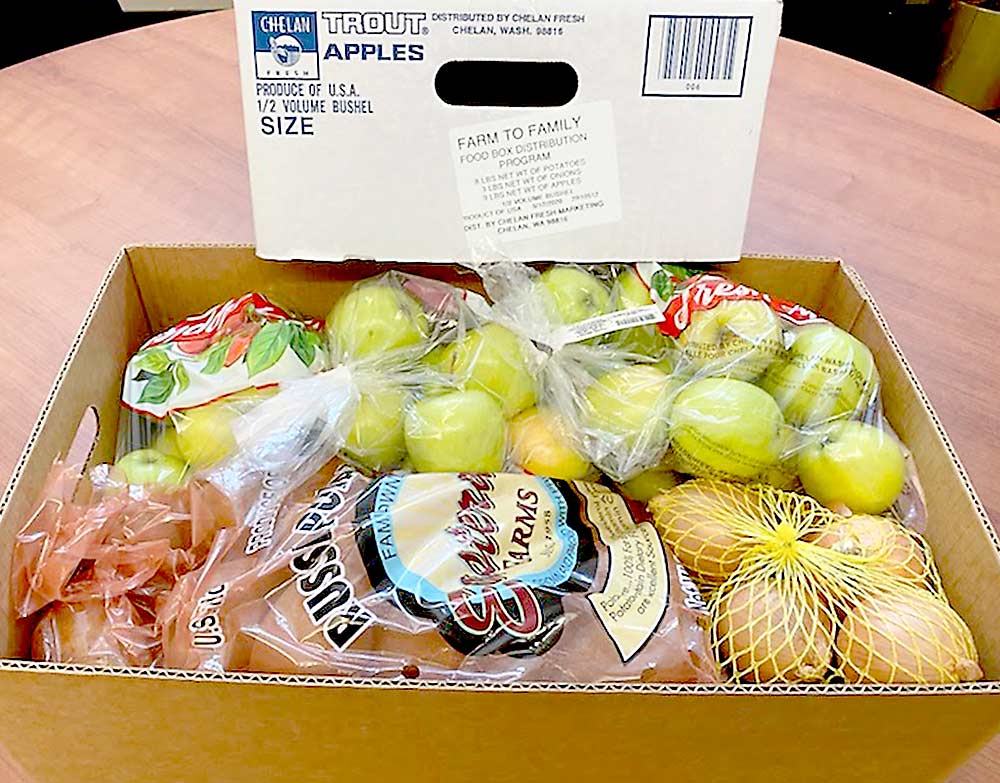
Thanks to a new U.S. Department of Agriculture coronavirus response program, two Washington apple shippers received money to produce fruit and vegetable boxes for families in need.
“What this means is we can help people in need, through no fault of their own, and we can move fruit at a price that pays the bills in the warehouse,” said Bryan Peebles, export manager for Chelan Fresh. The company shipped its first boxes with 9 pounds of apples, 8 pounds of potatoes and 3 pounds of onions on May 15. Later in the season, boxes would include cherries and pears as well, he said.
Oneonta Starr Ranch Growers started shipping on May 16, making boxes containing 10 pounds each of apples and pears, along with 5 pounds of potatoes and onions, said CEO Brett Reasor.
Those boxes went out just a week after the USDA awarded $1.2 billion in procurement contracts for the new program, which was announced in mid-April as part of the Families First Coronavirus Response Act, to purchase fresh produce, meat and dairy products from distributors who could set up a program to provide the food, in single family-sized boxes, to nonprofit organizations that will distribute them.
Other tree fruit warehouses may be selling fruit to other companies that landed contracts to distribute the boxes. The list of almost 200 awardees includes both large produce wholesalers and smaller farm markets, but some produce industry groups, including United Fresh Produce Association, raised questions about the selection process, such as whether all the awardees had the experience and distribution infrastructure necessary.
United Fresh CEO Tom Stenzel outlined concerns in a letter to the USDA Agricultural Marketing Service administration when the contracts were announced. Several weeks later he told the industry that, following conversation with agency officials, he felt more confidence in the program’s oversight.
“As we know, there will likely be many more bidders who offer their services than dollars or contracts allow, but we believe the process will continue to improve with a mutual industry and USDA goal to achieve maximum success for the program,” Stenzel and Produce Marketing Association CEO Cathy Burns said in a joint statement.
When the program was announced, Reasor said he heard first from distributors interested in buying his growers’ fruit, but the company decided that the intent of the program — to support farmers and families in need — could be better served by doing it themselves.
Fruit donations, of course, are a regular occurrence, and across the country packers have donated even more apples to food banks in response to the pandemic. This new USDA purchase opportunity comes at a time when exports have slowed and the industry is struggling to move some varieties, Reasor and Peebles said.
“It helps people that need it, that’s the most important thing, and it helps us move varieties that aren’t moving as fast,” Peebles said. Having a home for that fruit should help the industry at large, he added.
Donating in boxes packed for quick distribution, rather than wholesale, and including multiple commodities is a new approach for them, but the companies quickly figured out how to put the program together, and boxes were soon delivered regularly to local community groups and nonprofits around the West. Having relationships with food banks from USDA trade mitigation impact programs helped efforts come together quickly, Reasor said.
“We can only afford to donate so much before the farmer goes broke,” Reasor said. “For us, I do feel it’s a true representation of the farmer to family approach and we’re blessed we got awarded.”
Chelan Fresh received a $1.5 million contract and Oneonta Starr Ranch received $2.5 million for the first phase of the program, which ran through the end of June. Both companies submitted bids to continue providing boxes through the end of the year. •
—by Kate Prengaman
Related:
—Fruit industry questions eligibility for USDA direct payment program






Leave A Comment